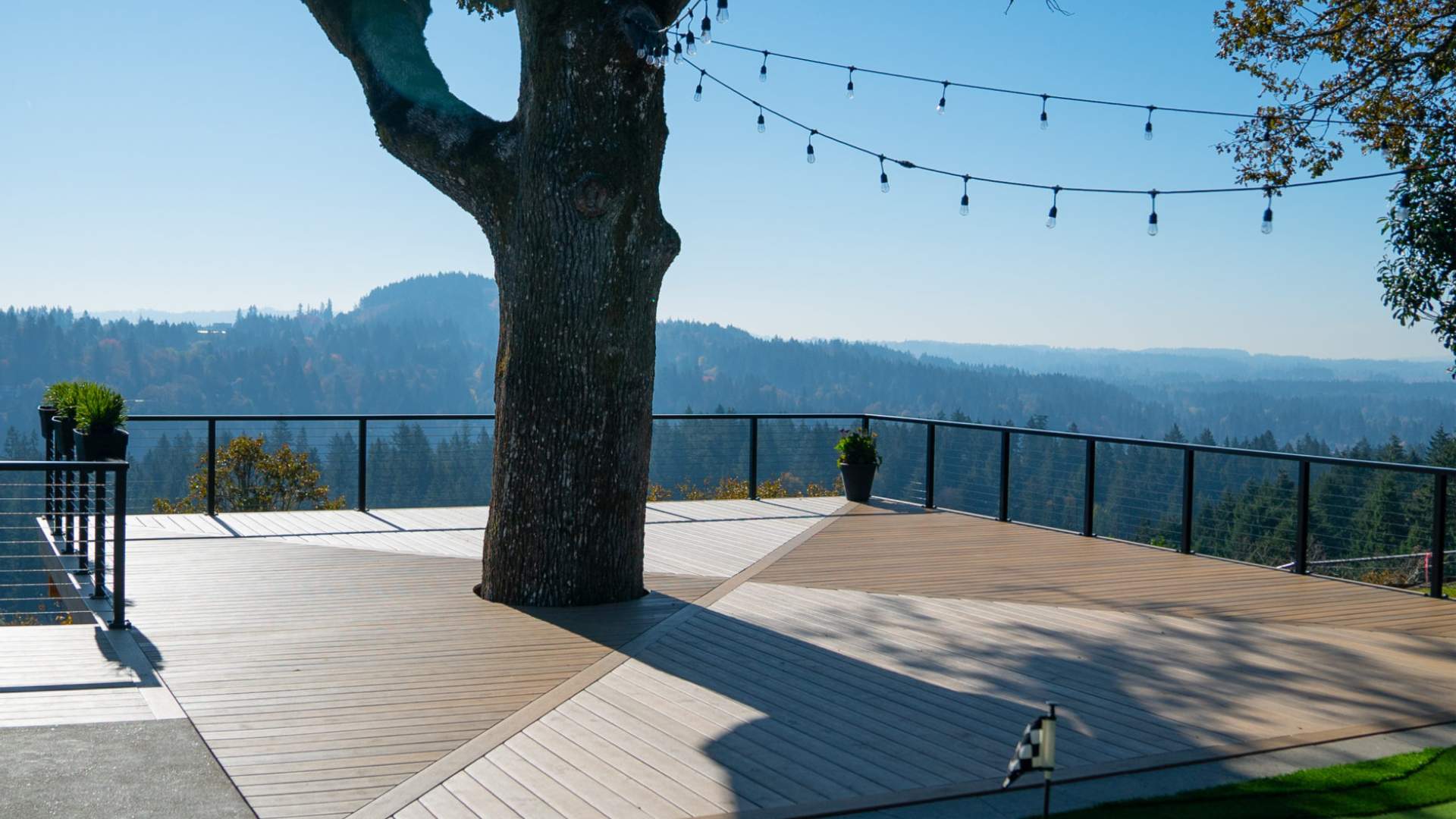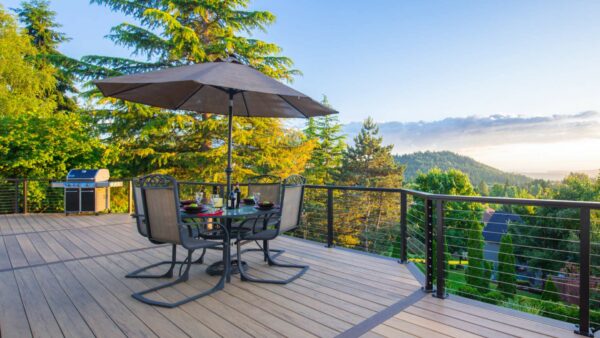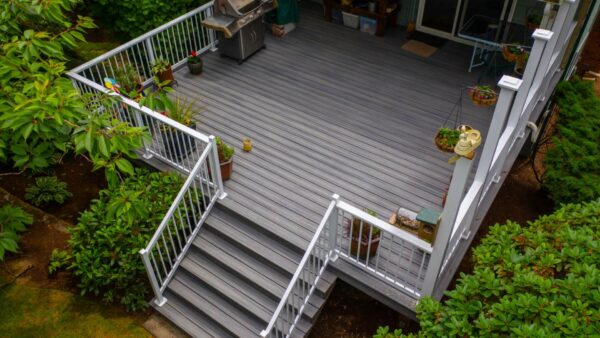The Great Decking Debate: Capped Composite Decking vs. PVC Decking — Which Is Right for Your Property?
February 23rd, 2023 | by Jim Gates

Are you dreaming of an outdoor deck space for the upcoming spring and summer seasons? Maybe you already know exactly how you want it to look; you saved every last detail on Pinterest.
Now all that’s left to do is decide on a material, and you are stumped.
Both capers composite decking and PVC decking are great options, so choosing the best one can be confusing. And we can help.
Use this guide to determine which product will best suit your lifestyle and needs. Here we will break down the pros and cons of each decking material so you can evaluate each product for yourself.
Table of Contents
- What Is Capped Composite Decking?
- What Is PVC Decking?
- The MAIN Difference Between Capped vs. Uncapped Composite Decking and PVC vs. Composite Decking
- Capped Composite vs. PVC Decking: 7 Factors To Consider
- Pros and Cons of Capped Composite Decking
- Pros and Cons of PVC Decking
- Still Unsure About Capped Composite Decking vs. PVC Decking for Your Outdoor Living Space? Request a Free Quote From Three Rivers Custom Decks
What Is Capped Composite Decking?
Capped composite decking is a plastic material with a recycled wood core wrapped in a plastic shell. This type of decking is usually made from 75-95% recycled materials and has been around since the late 1980s.
What Is PVC Decking?
Polyvinyl chloride (PVC) decking is made from high-strength plastic and is relatively new, entering the market in 2005. Depending on what you’re looking for, this engineered decking may be perfect for your deck renovation or new build.
The MAIN Difference Between Capped or Uncapped Composite Decking and PVC
Both capped composite, and PVC decking are more resistant to insects and moisture than wood, making them a popular and affordable option for building. They also both come in a variety of styles and color palettes. Because of this, most people choose one of these options.
Uncapped composite decking is known as the first generation of composite decking, and nowadays, there are more durable options than there used to be. People typically purchase uncapped composite decking if they are repairing an existing deck already made from this material.
Because uncapped composite decking isn’t protected like capped composite or PVC decking, it often:
- Fades
- Gets stained
- Molds
- Grows mildew
Capped composite decking is made from plastic products and wood fibers, while PVC decking is made from 100% recycled plastic.

Capped Composite vs. PVC Decking: 7 Factors To Consider
Which should you choose, capped composite or PVC decking?
It depends on what you’re looking for!
One thing is for sure; the plastic decking market is growing. In 2021, it was a $4.71 billion industry.
Composite decking alone was a $2.8 billion industry in 2020. And by 2027, this specific decking type is predicted to reach $5.8 billion.
Find out which product would be best for your space by contacting Three Rivers Custom Decks today. We specialize in making the most complicated deck projects look easy, and we use the highest quality deck materials available so that you can enjoy your outdoor area to the max.
#1: Cost
Composite decking prices start much lower than PVC options. The quality of the material is directly related to the price. Some products boast more protection from the elements than others.
Composite deck prices usually cost between $4.50 and $13 per square foot, while PVC decking can cost between $10 and $15 per square foot.
Of course, this will depend on:
- Where you live
- The design you choose; and
- The company you choose to work with for your installation
To get specific pricing details about your deck project, contact Three Rivers Custom Decks today. Let’s start turning your design dream into a reality.
#2: Appearance
Composite and PVC decking are both high-quality options when it comes to how they look.
PVC decking has improved its product to resemble wood finishes over the years. Capped composite decking naturally looks more authentic because it contains wood pulp.
However, nowadays, both products sell multi-toned pieces that resemble wood so you have beautiful wood-like options available no matter which you choose.
#3: Eco-Friendliness
PVC and composite decking are made from recycled materials. Usually, these products are biobased materials as they were developed to help use up some of the processed plastic created in our world.
However, PVC may be manufactured from virgin materials, so research its origin to ensure a carbon footprint-friendly product.
PVC is also 100% recyclable, while some composites cannot be recycled unless returned to the manufacturer.
#4: Colorfastness
Both capped composite decking and PVC decking are considered to be fade-resistant — this means your deck continues to look like new year after year.
There is no such thing as a 100% fade-proof deck, but you will never need to stain or paint decks made from either of these materials.
#5: Ease of Installation
Since PVC is lighter in weight, it is easier to move around during installation, even though it requires more skill.
However, both products:
- Can be installed with standard tools
- Contract and expand with varying temperatures
- Have hidden fastening connections for a seamless look
#6: Maintenance
Both decking options require less maintenance than wood and can be cleaned and maintained similarly.
Follow these recommendations to keep your deck in good shape:
- Clean messes immediately to prevent stains..
- Sweep regularly.
- Hose off dirt.
- Use soapy water, a deck cleaner, and a soft bristle brush to scrub and prevent mold growth.
#7: Durability
Both materials also hold up well over time. But pay close attention to their warranty options — typically, an extended warranty covers both products for 25 to 30 years.
No matter which you choose, both capped composite and PVC decking is an investment you can feel good about.

Pros and Cons of Capped Composite Decking
Because capped composite decking contains some wood pulp, it has a more natural look. Wood pulp also gives the decking more texture and makes it more slip-resistant. If your deck will be around a pool or handle a lot of running kids, this option may be best.
In addition, when in direct sunlight, capped composite decking won’t expand or contract as much as PVC can since the wood fibers make the material more rigid.
Some other pros to consider include::
- Durable and long-wearing
- Slip-resistant
- Insect infestation resistant
- Fire resistant
- Lower probability of warping
- Many color options
- Minimal upkeep
- Resembles natural wood
The major con to capped composite decking is that it can retain more heat and therefore feel hotter to the touch.
Pros and Cons of PVC Decking
People typically choose PVC decking because it is:
- Durable
- Pest-resistant
- Mold-resistant
- Stain-resistant
- Scratch-resistant
- Available in many color options
- Easy to maintain
- Lightweight
- 100% recyclable
- Easy to install
- Less heat-absorbing t than other decking options
Cons of PVC decking include:
- Cost
- The possibility of discoloration if sued with rubber or other PVC products
- Expands and contracts during temperature changes
- Requires more support when building the deck framework
Still Unsure About Whether Capped Composite Decking vs. PVC Decking Is Right for Your Outdoor Living Space? Request a Free Quote From Three Rivers Custom Decks
There are many options for decking, and you may still need some support when it comes to choosing which is best for your needs.
Three Rivers Custom Decks offers free quotes to find which material best suits your outdoor living space.
Knowing the pros and cons of a product helps you make an educated decision.
Whether you’re looking for a waterproof deck or something with a hardscape surface, our talented design team will build out your deck in the Portland Metro area. Let Three Rivers Custom Decks answer all your questions and guide you in the deck-building process.
Request a quote today. Let’s get your deck started together.
